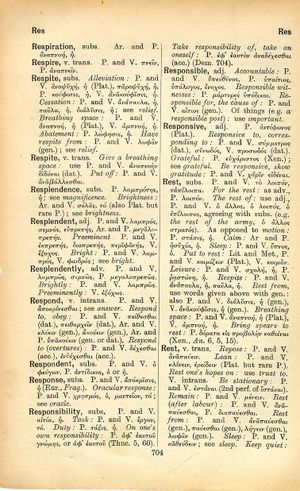respond: Difference between revisions
From LSJ
Ἔπαινον ἕξεις, ἂν κρατῇς, ὧν δεῖ κρατεῖν → Laus est, si, quibus est imperandum, tu imperes → Lob hast du, wenn du herrschst, worüber zu herrschen gilt
(CSV4) |
m (Woodhouse1 replacement) |
||
| Line 1: | Line 1: | ||
{{Woodhouse1 | {{Woodhouse1 | ||
|Text=[[File:woodhouse_704.jpg|thumb|link={{filepath:woodhouse_704.jpg}}]] | |Text=[[File:woodhouse_704.jpg|thumb|link={{filepath:woodhouse_704.jpg}}]] | ||
P. and V. ἀποκρίνεσθαι; see [[answer]]. | ===verb intransitive=== | ||
[[prose|P.]] and [[verse|V.]] [[ἀποκρίνεσθαι]]; see [[answer]]. | |||
[[respond to]], [[obey]]: [[prose|P.]] and [[verse|V.]] [[πείθεσθαι]] (dat.). [[πειθαρχεῖν]] (dat.), [[Aristophanes|Ar.]] and [[verse|V.]] [[κλύειν]] (gen.), [[ἀκούειν]] (gen.), [[Aristophanes|Ar.]] and [[prose|P.]] [[ὑπακούειν]] (gen. or dat.). | |||
[[respond to]] ([[overture]]s): [[prose|P.]] and [[verse|V.]] [[δέχομαι]], [[δέχεσθαι]] (acc.), [[ἐνδέχεσθαι]] (acc.). | |||
}} | }} | ||
Revision as of 08:53, 20 May 2020
English > Greek (Woodhouse)
verb intransitive
P. and V. ἀποκρίνεσθαι; see answer.
respond to, obey: P. and V. πείθεσθαι (dat.). πειθαρχεῖν (dat.), Ar. and V. κλύειν (gen.), ἀκούειν (gen.), Ar. and P. ὑπακούειν (gen. or dat.).
respond to (overtures): P. and V. δέχομαι, δέχεσθαι (acc.), ἐνδέχεσθαι (acc.).

